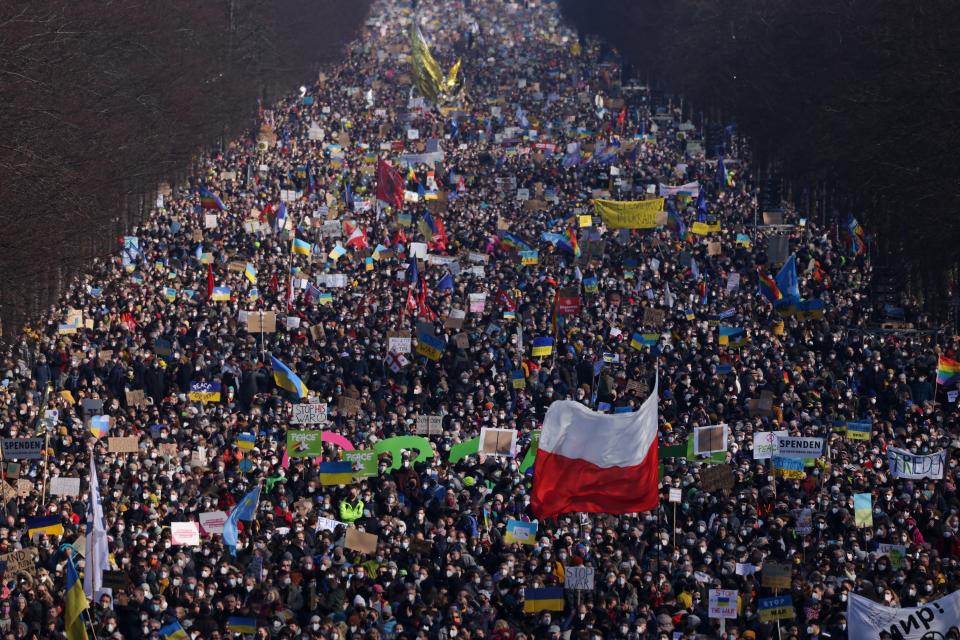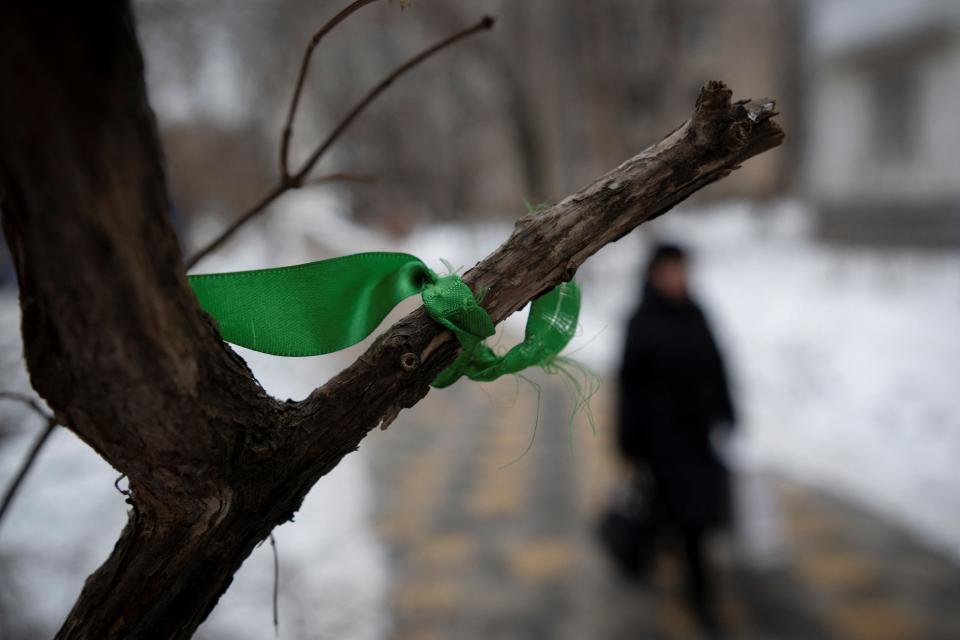'They can come for you': For Russian protesters, a free-speech crackdown sharpens threat
- Oops!Something went wrong.Please try again later.
LONDON — Oleg Kashintsev, a retired police officer in Russia, may spend eight years in prison. His crime? Spreading fake news, according to Russian authorities
Olesya Krivtsova, 19, is considered a terrorist and extremist, the equivalent of a member of ISIS or the Taliban. She is facing 10 years in prison. Her crime? She posted a photo of the explosion on the bridge to the occupied Crimean Peninsula, according to Russian news agency TASS.
Everyday Russians, like Kashintsev and Krivtsova, who try to protest the war in Ukraine face the specter of year's in “Putin’s prisons.'' Still, as the one-year anniversary of the war in Ukraine approaches, the protests from Russians continue, despite the penalties.
Russia's leading human rights defenders are alarmed.
“People get detained for posts on social media or even for bringing flowers to the victims of bombings in Ukraine. These political repressions remind us of the Soviet era mass arrests,” activist Svetlana Gannushkina said.
A week after the war began last year, Russian President Vladimir Putin signed a law that makes sharing “fake news" a crime. Russia defines fake news as any information about the war that is different from what the Ministry of Defense – the definitive source – explains in news releases.
More than 6,000 Russians have been charged with administrative violations and 520 Russians have been sentenced to prison, sometimes facing years behind bars, according to Political Prisoners Support, an independent group monitoring the Kremlin’s crackdown over the past year.
Although Russia had previously passed fake-news laws, last year's version was far more aggressive. A 2019 law, for instance, only carried a 15-day jail sentence for “unreliable” information. Now, critics face up to 15 years in prison.
Misinformation has a long tradition in Russia. In fact, it was a global news event when Putin for the first time, in December, called the situation in Ukraine a war, not a special military operation. To some analysts, it was an example of how shaded, Orwellian language permeates the flow of information in Russia.
Dig deeper: Putin suspends nuclear arms treaty as US-Russia tensions build amid Ukraine war anniversary

'They can come for you'
Human rights defenders are alarmed at how little protesters have to do to receive harsh consequences.
“This is the first time we see people being prosecuted purely for their negative opinion,” said Sergei Davides, the head of Political Prisoners Support.
Prosecutors and judges don't consider any presumption of innocence. The implementation of new laws ensures the only accepted opinion about the war is that of the Russian Ministry of Defense, he said.
"If for some reason you have heard their line, but relied on an independent report, they can come for you," Davides said.

'We came out every day'
But despite Putin’s law issued on March 4, 2022, Russians have not stopped protesting the Ukraine war.
“We came out every day, walked around Moscow’s central streets, but police had orders of operation ‘Fortress,’ which meant they could grab everybody,” said Ivan Ivashkin, an actor from Moscow now living in exile in London. “And they beat many people violently, drawing blood.”
Over the past year, the impact of the free-speech crackdown has spread beyond Russia’s major cities, such as Moscow and St. Petersburg, to the most remote corners of the sprawling country, where regions are isolated from factual information and news. In the Putin era, for the first time, the courts prosecute “purely for an opinion different from the general line published by the Defense Ministry,” Davides said.
Arrested 4,000 miles from Moscow
Journalist Maria Ponomarenko was sent to a detention center in the remote region of Altai on charges of discrediting Russian armed forces. Earlier this month, she was sentenced to six years in prison. Addressing the court in Siberia, Ponomarenko said that ''no totalitarian regime has ever been as strong as before its collapse."
Activist Vladislav Nikitenko was arrested in his hometown, more than 4,000 miles from Moscow, for writing to Russian prosecutors and demanding an investigation into Putin's "acts of international terrorism."
He was sentenced to three years in prison for "discrediting the army" by a court in Blagoveshchensk, a city on the border with China in Siberia.
“Putin’s been pushing his critics into the kitchens, into the underground,” said Gannushkina, a board member of Moscow’s Sakharov Center, which is devoted to the protection of human rights in Russia.
Gannushkina noted that everyone in the country who condemns the war is designated as a “foreign agent.”
When people are designated foreign agents by the Ministry of Justice, they have to report to authorities about their work. Under the law, the “foreign agent” label must be put on every post they publish under their own names or their organizations' names, or they have to pay fines of up to $14,000.
Still, Gannushkina believes it is becoming “impossible to hide the truth” in Russia about the war.
Even so, reports of torture are widespread.
Dig deeper: 'It's hard, but they're holding on': On the ground in Ukraine, the war depends on U.S. weapons
How many Russians have left?
Thousands of Russian prisoners are being recruited to fight in Ukraine, according to Russia Behind Bars, a nongovernmental organization monitoring the lives of Russian convicts.
“The entire country feels like prison to political dissidents,” said Olga Romanova, founder of the prisoners rights group.
She said the Kremlin has recruited more than 50,000 criminals since summer, and only about 10,000 have survived.
Ultimately, more than 700,000 Russians left the country shortly after a crackdown was announced in September, according to Forbes.
In October, the interior minister of Kazakhstan, Marat Akhmetzhanov, told Russian newspaper Kommersant that at least 200,000 Russian citizens had entered the country.
At least 112,000 Russians had relocated to neighboring Georgia by the fall. More than 1.3 million Russians had entered European Union countries since the beginning of the war, according to the European Border and Coast Guard Agency.
“Ever since Feb. 24, (2022,) Russian authorities have been doing everything to destroy any signs of dissent,” said Tania Lokshina, a Human Rights Watch researcher. “In one year, Russia has turned from a brutally authoritarian regime to being on the verge of a totalitarian system.”
Ilya Prusikin, front man of a popular Russian punk group called Little Big, had to leave the country at the end of January after releasing a song called “Generation Cancellation.” It was viewed by 14 million people on YouTube.
The Russian Ministry of Justice designated Prusikin as a foreign agent.
“People get seven and more years in prison for calling this war a war,” he said in an email. “Our own country is destroyed by Putin and his men behaving like feudal lords Not only Ukraine is being destroyed."
Dig deeper: US has spent billions on Ukraine war aid. But is that money landing in corrupt pockets?
This article originally appeared on USA TODAY: Amid beatings and arrests, protests in Russia over Ukraine war persist

